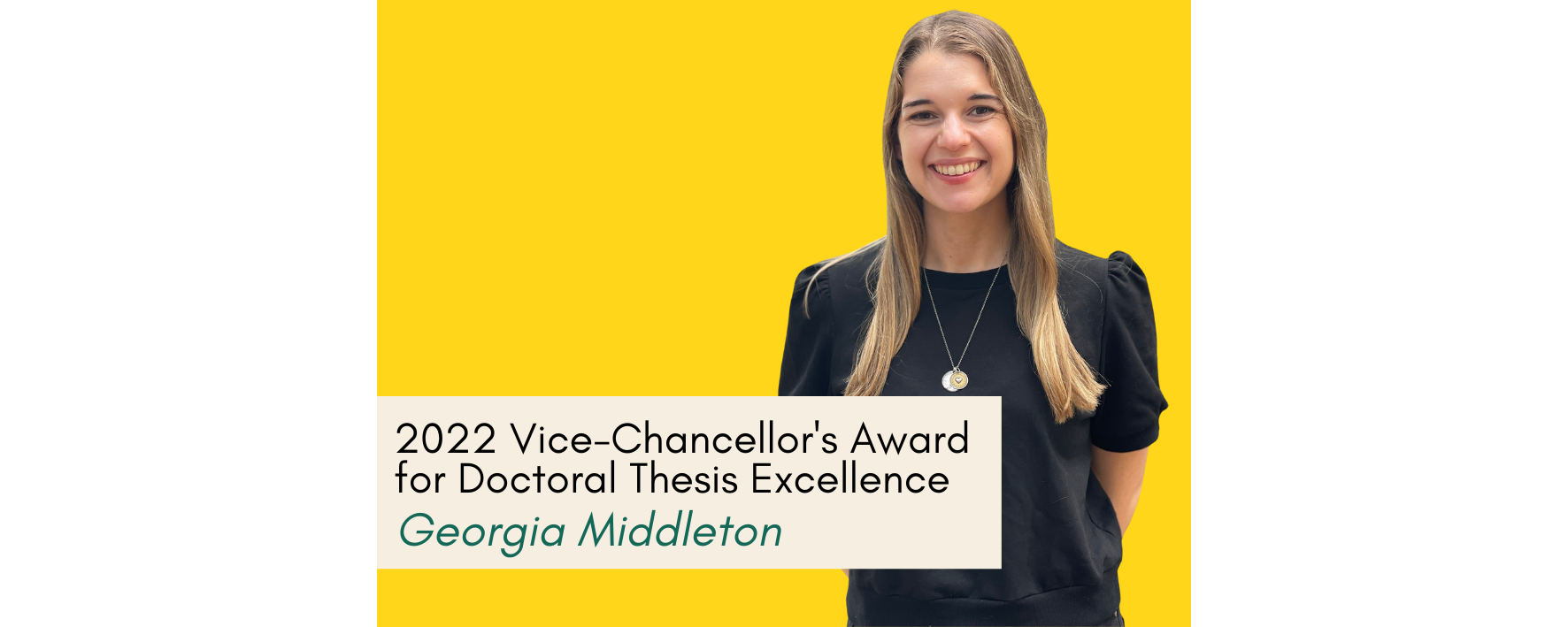
Georgia Middleton is from the College of Nursing and Health Sciences and is one of the 12 winners of the Vice-Chancellor’s Award for Doctoral Thesis Excellence for 2022. Her supervisors were Professor John Coveney, Professor Rebecca Golley and Dr Karen Patterson.
Georgia’s thesis, “The family meal; then and now, a 30-year comparison study” set out to provide a comprehensive understanding of the work required to execute the family meal over the last three decades. The findings provide a valuable understanding of the components necessary for executing family meals, the barriers and enablers parents face when attempting to execute family meals, and how these experiences have evolved across time.
We asked Georgia to share what the award means, the PhD journey and advice to current or prospective students. t
What does winning this award mean?
Winning this award was a valuable recognition of the hard work I put into my PhD and my thesis. It was a huge boost of confidence, and a reminder that my research is valued and important. I had an amazing supervisory panel and informal and formal support networks, and this award also reflects the significant contribution their support and encouragement had on my ability to undertake this work.
![]()
What led you to undertake a PhD? What inspired or motivated you?
Working as a private practice dietitian across South Australia was a life-changing experience, with first-hand exposure to the fierce inequities in resources, services, and education available to foster health and wellbeing in the community. This experience led me to undertake my PhD, with the intention of trying to improve health outcomes from a systems, rather than individual level.
![]()
What was the topic of your PhD and why is it important to you?
The topic of my PhD was how the family meal has changed over time. Social eating environments have always fascinated me, and the family meal is such a traditional shared eating occasion, steeped in social expectation and meaning. With the large changes to social and family life we’ve seen over the last few decades, I was interested to see whether this had translated to changed family meal processes and practices. Through my PhD, I found stability in most family meal practices and expectations, which is surprising considering how different family life is now than it was in the 90’s. While it is comforting to know that the family meal is still a valued tradition, the burden of responsibility for executing family meals is still largely placed on women and mothers, despite their increasing participation in the formal workforce.
![]()
Tell us about your PhD journey
My PhD journey was full of great opportunities, and wonderful people. I was fortunate to have an amazing group of peers who were undertaking their PhDs in nutrition and dietetics at the same time, and my journey would have been completely different without their support and encouragement. Undertaking the bulk of my recruitment and data collection during the COVID-19 pandemic was extremely challenging, but the pride and relief I felt at being able to still complete my PhD despite this challenge cannot be understated. I was able to present at international conferences (albeit virtually as a result of the pandemic!), I was a University finalist in the 3-Minute Thesis competition, produce publications and engage with mainstream media about my work.
![]()
What has been one of the most enjoyable parts of the journey?
Discovering new knowledge, learning new methods and skills, and meeting amazing, inspiring people!
![]()
Where are you now?
I am still at Flinders University, working in an amazing research team within the Caring Futures Institute. I am still pursuing research in the field of family meals but have also been contributing to research projects around supporting families to help improve health outcomes of parents and children.
![]()
What advice would you give to current or prospective PhD students?
It is hard to say no to opportunities during your PhD, and it is important to make the most of your experience. However, there are only so many hours in a day, and days in a week, and you do need to prioritise completing your PhD. I would encourage students to really think about what they are hoping to get out of their candidature so they can be selective about which opportunities to say yes to, and which to perhaps pass on. I would also encourage students to form a supportive network with their peers – this was so important for my PhD journey and I don’t think I would have gotten through it without the support of my wonderful peers, many of whom I am sure will be friends for life.
![]()

